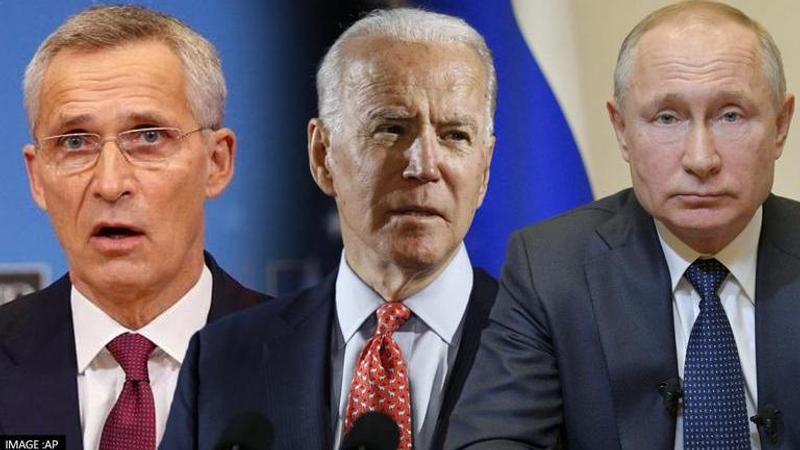Published 12:50 IST, January 17th 2022
NATO allies 'unsettled' with 'one-sided ideas' floated by US in talks with Russia: Report
Even before officials went on air with transcripts of dialogues that they held with their Russian counterparts, US was pressing on 'certain ideas' on the table

The North Atlantic Treaty Organisation, or North Atlantic Alliance (NATO) has been left perturbed by allegedly “one-sided” ideas floated by the US officials during the negotiations on the security guarantees with Russian counterparts to defuse Ukrainian tensions and threats of Moscow invasion, according to a new explosive report.
Diplomats at the NATO told The Wall Street Journal newspaper on condition of anonymity that even before the officials went on air with the transcripts of dialogues that they held with their Russian counterparts, the US was pressing on the idea of “reciprocal reduction” in the size and scope of military exercises by NATO in eastern Europe as demanded in Russian treaties.
This idea was on the table despite NATO rejecting those calls, reminding that no third party, including Russia should have veto power over the sovereign states of NATO.
A Ukrainian soldier holds a cat and walks in a trench on the line of separation from pro-Russian rebels near Debaltsevo, Donetsk region. [Credit: AP]
"If Russia stays at the table and takes concrete steps to de-escalate tensions, we believe we can achieve progress," US' Wendy Sherman had told press briefing, afterward. "But if Russia walks away from the diplomatic path, it may well be quite apparent that they were never serious about pursuing diplomacy at all."
But at a more personal briefing on Sunday, US Deputy Secretary of State Wendy Sherman recommended that NATO must consider designating some areas of the Black Sea off-limits for exercises, as has been demanded by Russian counterparts in Geneva. These talks were “behind the scenes” while in public US allies and NATO ruled out curbing the military expansion and removing weaponry in the alliance’s eastern regions.
While Sherman’s recommendations left NATO officials unsettled, the alliance instead made demands for Washington to “re-establish limits” with Russia in terms of the intermediate-range missiles.
Russian Foreign Minister Sergey Lavrov, left, presidential aide Yury Ushakov, center, and Defense Minister Sergei Shoigu wait for the beginning of the Russia-Turkey talks in the Kremlin iin Moscow, Russia. [Credit: AP]
The Intermediate-range Nuclear Forces Treaty (INF) of the arms-control framework that ended the Cold War era between Washington and Moscow collapsed in 2019 after the former US President Donald Trump accused Russia of violating its terms and handed 60-day ultimatum into verifiable and full compliance. That Ultimatum expired on Feb. 2, 2020. The treaty the US then unilaterally pulled out of required Russia to suspend all Intermediate-Range and Shorter-Range Missiles, weapons systems, and conventional ground-launched ballistic and cruise missiles with ranges of 500 to 5,500 kilometres.
But in its July 2014 Compliance Report, the US accused Russia of breaching terms of the obligation so as “not to possess, produce, or flight-test” a ground-launched cruise missile having a range of 500 to 5,500 kilometres. On Oct. 20, 2018, ex-US President Donald Trump announced his intention to “terminate” the INF Treaty, and by Dec. 4, 2018, the US had suspended treaty obligation announcing “material breach” and giving 60 days for compliance.
Recommendations not formally brought to Russia: Sources
Both US and NATO diplomats, who spoke to WSJ, repeated that these talks haven’t yet formally been brought to Russia, but were being discussed on both sides [US, NATO]. And that, there would be many more consultations and dialogues among allies and partners before deals are struck. “If anything is going to be turned into concrete proposals, and even more so concrete agreements, then that is going to be discussed in detail with allies,” NATO Secretary-General Jens Stoltenberg informed after the second round of consultation with Moscow in Brussels.
But it is not unknown that NATO has been pushing back on the Russian demands of sweeping security guarantees and has instead focused on more transparency on arms control and military activities from Russia that has amassed close to 100,000 troops on the frontier with Ukraine, but neither NATO nor US can guess Russia’s next move. NATO, on the other hand, has concentrated 5,000 troops in Poland and the Baltic countries. But as diplomats put it, there is no word “concession” in the dialogues. “I would never use the word concessions,” US Ambassador to NATO Julianne Smith told WSJ reporters. “There’s nothing that worries me about that. We repeat the word reciprocal a lot.”
“NATO is offering scraps", meanwhile, a European diplomat at NATO explained. “The US could offer larger pieces of meat, mostly from the vulnerable part of the animal, which is the eastern flank,” he metaphorically elaborated on the situation with the reporters. Another US Ambassador to NATO continued, “Are there different perspectives? Yes, every country brings a different history to the table, everyone sits in a different corner of Europe. Some are extremely close to Russia. Some feel like it’s much further away.”
Updated 12:50 IST, January 17th 2022






